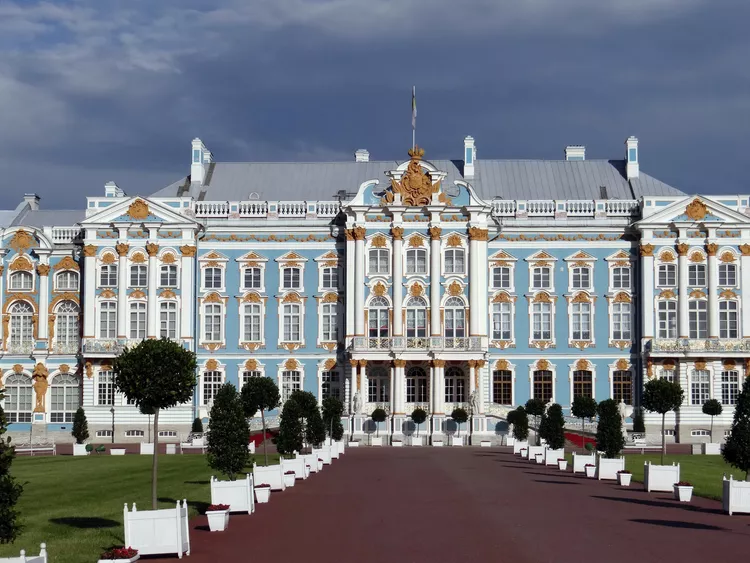Summary
Catherine Palace Overview
The Catherine Palace near St. Petersburg is one of the world’s great royal residences. It was significantly damaged during World War II but has been restored. The most famous mystery related to the Catherine Palace is the fate of the famous Amber Room, which disappeared during the War. The room has been reconstructed and is a unique feature unlike any other room in any other palace.
Exterior View
Catherine Palace (also called Tsarskoye Selo or the Tsar’s Village) is located in the small town of Pushkin, about 17 miles south of St. Petersburg, Russia. The palace’s ornate, baroque design is breathtaking, and its 740-meter (2427 feet) length is massive. Like many St. Petersburg structures, the Catherine Palace is brightly painted. The exterior is a brilliant robin’s egg blue, trimmed in white and gilded with over 200 pounds of gold.
Peter the Great presented the palace’s estate to his wife Catherine in 1710, and it served as the imperial family’s summer residence until the time of the last Tsar in 1917. During the reign of Peter’s daughter, Empress Elizabeth, the size of the palace was significantly increased during the mid-1700s by the famous architect Bartolomeo Francesco Rastrelli, who gave the palace its distinctive baroque style. The Baroque interior design of the palace was changed during the reign of Catherine the Great (Catherine II) to suit her more neo-Classical taste.
Chapel
:max_bytes(150000):strip_icc():format(webp)/st_petersburg270-56a1f66e5f9b58b7d0c5322d.jpg)
The northern wing of Catherine Palace near St. Petersburg is topped by the five golden domes of the Palace Chapel. Although over 200 pounds of gold were originally used to gild the exterior of the palace, today it is primarily decorated with gold paint.
Long Hallway Provides Interesting Views
Catherine Palace has a unique layout with doorways positioned equidistant from the exterior walls. Consequently, guests standing in a doorway can see through many rooms and for hundreds of feet. The abundance of mirrors and windows enhances the light and overall impression of this grand view. This architectural feature closely resembles the hallways at the Hermitage.
Grand Ballroom
The Great Hall (also known as the Grand Ballroom) is Rastrelli’s centerpiece room at the Catherine Palace near St. Petersburg, Russia. The Great Hall is almost 56 feet wide and over 154 feet long, occupying the entire width of the palace on the second floor. The two tiers of windows give a grand impression, while the gilded mirrors between the windows create a stunning effect. The intricately painted ceiling and magnificent inlaid parquet floor further enhance its elegance. Each gilded carving on the walls is a masterpiece, showcasing the artistry of the era.
This room invites guests to imagine the luxurious gatherings of the 18th century, featuring music and lively conversation.
What Happened to the Amber Room?
:max_bytes(150000):strip_icc():format(webp)/st_petersburg272-56a1f66f3df78cf772708cb3.jpg)
The Amber Room is arguably the most famous feature of Catherine Palace and was originally used as a study. The beautiful inlaid amber panels were a gift from King Frederick William of Prussia to Peter the Great after he admired them in Frederick’s palace. The panels consisted of over 100,000 perfectly fitted pieces of amber. Tragically, during World War II, the Nazis dismantled the amber panels and transported them to Germany, where they have never been recovered. The fate of the Amber Room panels remains shrouded in mystery, and many believe they still exist somewhere in Germany. Russian artists have been diligently recreating the amber panels using traditional techniques since the early 1980s, and the restored room was unveiled to the public in 2003.
Bedroom of Maria Fiodorovna
Empress Catherine II (Catherine the Great) preferred classical interiors over the Baroque style prominent in Catherine Palace. Consequently, the interiors designed by Scottish architect Charles Cameron are known for their exquisite beauty, minimalistic decoration, and elegant materials. One notable room he designed is the bedroom of Maria Fiodorovna, the wife of Grand Duke Pavel Petrovich, heir to the throne. Cameron utilized his favored technique of recreating Pompeian murals in three-dimensional forms, giving the room a distinctly Roman ambiance.
Green Dining Room
Charles Cameron drew upon his extensive knowledge of ancient Roman art and decorative motifs in the design of the Green Dining Room at Catherine Palace near St. Petersburg, Russia.
Hermitage Pavilion
:max_bytes(150000):strip_icc():format(webp)/st_petersburg315-56a1f6703df78cf772708cd1.jpg)
The Hermitage Pavilion is located a short distance from Catherine Palace and is one of two garden pavilions on the palace grounds. This charming structure serves as a serene retreat or entertainment venue for members of the royal family. Rastrelli’s design resembles a miniature palace, adding to its allure.
One intriguing aspect of the Hermitage Pavilion is the innovative mechanism that allowed tables pre-set with meals to be raised into the Central Hall of the upper floor. While guests enjoyed each other’s company, exquisite dishes would suddenly appear from hidden compartments, much to their delight.
Strolling the Streets of St. Petersburg
:max_bytes(150000):strip_icc():format(webp)/st_petersburg326-56a1f66e3df78cf772708caa.jpg)
After exploring the stunning interiors of Catherine Palace and wandering through its gardens, local guides often take visitors for lunch at a beloved St. Petersburg eatery known as Teaspoon. This deli-style restaurant features a variety of delicious blini sandwiches and cold meat salads, making it a popular choice among locals.
The building featured in this photograph is St. Petersburg’s largest department store, Gostiny Dvor, which spans an entire city block. Built between 1761 and 1785, it was among the world’s first shopping malls. Originally comprising over 175 separate shops, today it functions as one large store, offering a diverse shopping experience.
Guides highlight many intriguing sights, such as this department store, that travelers may overlook when navigating the city via bus. Visiting Catherine Palace and the charming streets of St. Petersburg creates unforgettable memories.




